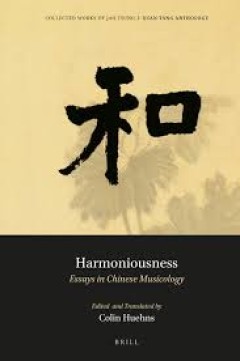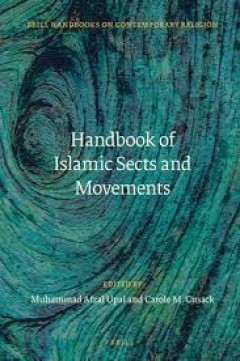Filter by

Home-Based Work and Home-Based Workers (1800-2021)
During the Covid-19 pandemic, the home as a workplace became a widely discussed topic. However, for almost 300 million workers around the world, paid work from home was not news. Home-Based Work and Home-Based Workers (1800-2021) includes contributions from scholars, activists and artists addressing the past and present conditions of home-based work. They discuss the institutional and legal his…
- Edition
- -
- ISBN/ISSN
- 978-90-04-49961-4
- Collation
- xxii, 443 pp
- Series Title
- Studies in Global Social History, Volume: 45
- Call Number
- -

Holy Ground: Where Art and Text Meet : Studies in the Cultural History of India
The 31 selected and revised articles in the volume Holy Ground: Where Art and Text Meet, written by Hans Bakker between 1986 and 2016, vary from theoretical subjects to historical essays on the classical culture of India. They combine two mainstreams: the Sanskrit textual tradition, including epigraphy, and the material culture as expressed in works of religious art and iconography. The study o…
- Edition
- -
- ISBN/ISSN
- 978-90-04-41207-1
- Collation
- xx, 700 pp
- Series Title
- Gonda Indological Studies, Volume: 20
- Call Number
- -

History of Wills, Testators and Their Families in Late Medieval Krakow : Tool…
This volume offers the first comprehensive analysis of wills in late medieval Krakow. It presents the origins of testamentary acts in the Kingdom of Poland and its centre, Krakow, and their subsequent transformation from so called ‘canonical wills’ to ‘communal wills’. Wysmułek discusses the socio-cultural role of wills and sets them in their contemporary legal, social, and economic co…
- Edition
- -
- ISBN/ISSN
- 978-90-04-46144-4
- Collation
- xiv + 403 pp
- Series Title
- Later Medieval Europe, Volume: 23
- Call Number
- -

Historicizing Sunni Islam in the Ottoman Empire, c. 1450-c. 1750
Articles collected in Historicizing Sunni Islam in the Ottoman Empire, c. 1450-c. 1750 engage with the idea that “Sunnism” itself has a history and trace how particular Islamic genres—ranging from prayer manuals, heresiographies, creeds, hadith and fatwa collections, legal and theological treatises, and historiography to mosques and Sufi convents—developed and were reinterpreted in the …
- Edition
- -
- ISBN/ISSN
- 978-90-04-44029-6
- Collation
- xvi, 530 pp
- Series Title
- Islamic History and Civilization, Volume: 177
- Call Number
- -

Neues von der Insel = Englische Literatur und Kultur der Frühen Neuzeit in d…
Ein interdisziplinärer Band im Open-Access: Die Aufwertung der Volkssprachen in der Frühen Neuzeit führte zu einer Intensivierung und internationalen Öffnung der europäischen Übersetzungskultur. Der Gebrauch des Englischen bleibt in dieser Zeit allerdings weitgehend auf die Insel beschränkt, während die Sprache auf dem Kontinent noch wenig geläufig ist. Erst seit dem 18. Jahrhundert ge…
- Edition
- 1
- ISBN/ISSN
- 9783662669495
- Collation
- XII, 467 ill; lamp
- Series Title
- 2
- Call Number
- -

Martin Waldseemüller’s 'Carta marina' of 1516 : Study and Transcription of…
This open access book presents the first detailed study of one of the most important masterpieces of Renaissance cartography, Martin Waldseemüller’s Carta marina of 1516. By transcribing, translating into English, and detailing the sources of all of the descriptive texts on the map, as well as the sources of many of the images, the book makes the map available to scholars in a wholly unprece…
- Edition
- 1
- ISBN/ISSN
- 9783030227036
- Collation
- VII, 150 hlm,: ill, lamp;
- Series Title
- -
- Call Number
- -

Historical-Critical Dictionary of Marxism : A Selection
The Historical-Critical Dictionary of Marxism (HCDM) is a comprehensive Marxist lexicon, which in the 9 German-language volumes concluded so far has involved over 800 scholars from around the globe. Conceived by philosopher Wolfgang Fritz Haug in 1983, the first volume of the ongoing lexicon project was published in 1994. This first English-language selection introduces readers to the HCDM’s …
- Edition
- -
- ISBN/ISSN
- 978-90-04-67902-3
- Collation
- lviii, 693 pp
- Series Title
- Historical Materialism Book Series, Volume: 294
- Call Number
- -

Harmoniousness: Essays in Chinese Musicology
From prehistoric bone flutes to Confucian bell-sets, from ancient divination to his beloved qin, this book presents translations of thirteen seminal essays on musical subjects by Jao Tsung-i. In language as elegant and refined as the ancient texts he so admired, his journey takes readers through Buddhist incantation, the philosophy of musical instruments, acoustical numerology, lyric poetry, hi…
- Edition
- -
- ISBN/ISSN
- 978-90-04-51707-3
- Collation
- xvi, 441 pp
- Series Title
- Collected Works of Jao Tsung-i, Volume: 1
- Call Number
- -

Handbook of Megachurches
The growth of the megachurch (generally defined as a regular attendance of over 2,000 people) is undoubtedly one of the most exceptional religious trends of recent times, certainly within the Christian sphere. Spreading from the USA, megachurches have now become common globally - reaching different national and cultural contexts. The edited volume Handbook of Megachurches offers a comprehensive…
- Edition
- -
- ISBN/ISSN
- 978-90-04-41292-7
- Collation
- xiv, 362 pp
- Series Title
- Brill Handbooks on Contemporary Religion, Volume: 19
- Call Number
- -

Handbook of Islamic Sects and Movements
The Handbook of Islamic Sects and Movements offers a multinational study of Islam, its variants, influences, and neighbouring movements, from a multidisciplinary range of scholars. These chapters highlight the diversity of Islam, especially in its contemporary manifestations, as a religion of many communities, theologies, and ideologies. Over five sections—on Sunni, Shia, Sufi, fundamentalist…
- Edition
- -
- ISBN/ISSN
- 978-90-04-43554-4
- Collation
- -
- Series Title
- Brill Handbooks on Contemporary Religion
- Call Number
- -
 Computer Science, Information & General Works
Computer Science, Information & General Works  Philosophy & Psychology
Philosophy & Psychology  Religion
Religion  Social Sciences
Social Sciences  Language
Language  Pure Science
Pure Science  Applied Sciences
Applied Sciences  Art & Recreation
Art & Recreation  Literature
Literature  History & Geography
History & Geography